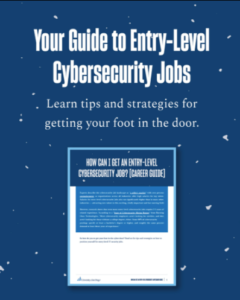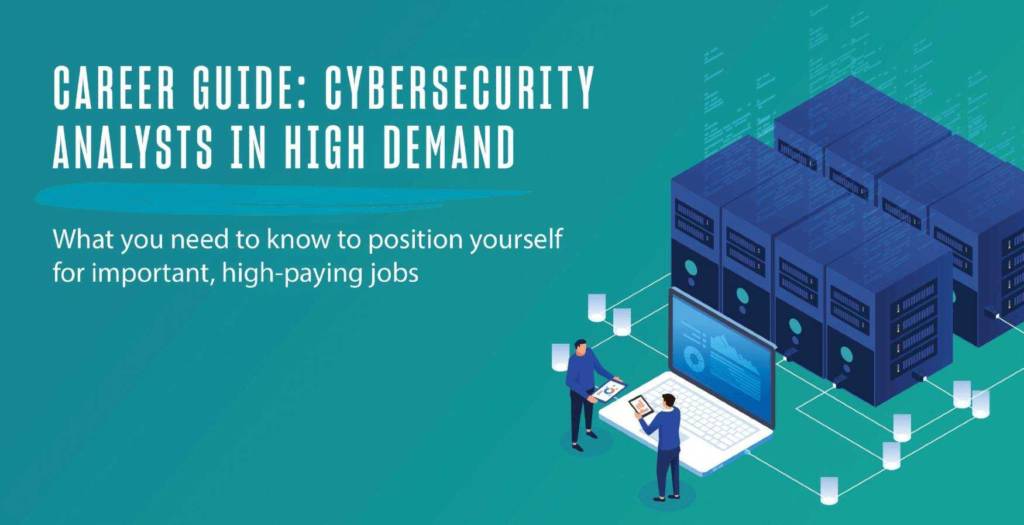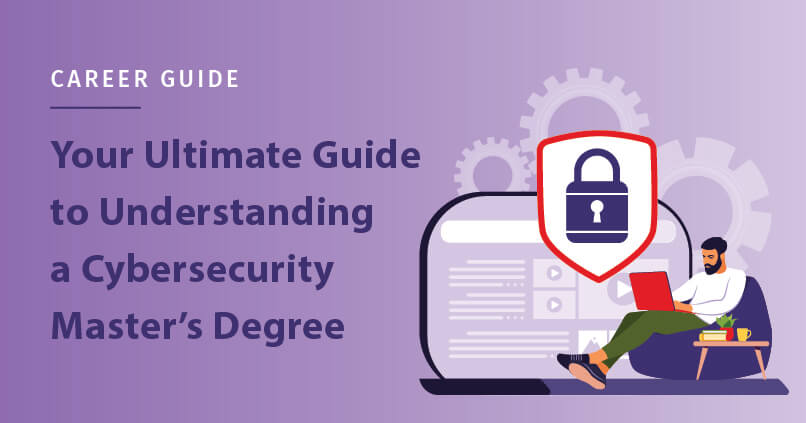If you’re interested in an exciting, innovative, fast-paced field with excellent job security and the potential for a lucrative salary, look no further than cybersecurity. Businesses and organizations across all sectors are eager to employ skilled cybersecurity professionals, often offering high salaries to attract top talent.
Even entry-level cybersecurity roles tend to pay significantly more than in many other fields — drawing new talent to this dynamic and rapidly evolving industry.
However, it’s common for many entry-level cybersecurity jobs to require at least a few years of related experience, so how do you get your foot in the cyber door? Read on for tips and strategies on how to position yourself for entry-level IT security jobs.
The Cybersecurity Talent Shortage
One thing that’s working in your favor: Businesses, organizations and government agencies of all shapes, sizes and missions are in need of cybersecurity professionals — and there isn’t enough skilled talent to go around.
Despite the shortage, businesses and organizations are actively seeking candidates who have the right knowledge, skills and experience — even for entry-level positions.
As one article puts it: “It has been said for years that the cybersecurity talent shortage isn’t the lack of people. It is the lack of the right people, and that includes those at the entry-level as well as those with more experience.”
According to the Lightcast Quarterly Cybersecurity Talent Report, there’s approximately 225,200 unfilled cybersecurity positions across the United States with the greatest shortage among experienced cybersecurity professionals. Interestingly, the report found there’s actually a surplus of professionals who have anywhere from 0–2 years of experience, which means that to obtain an entry-level position, you really need to set yourself apart from the competition.
[RELATED] How to Land One of the 9 Best Jobs in Cybersecurity >>
7 Key Cybersecurity Workforce Categories
As part of its National Initiative for Cybersecurity Education (NICE), the National Institute of Standards and Technology (NIST) created a detailed set of guidelines that applies across public, private and academic sectors. The goal is to help organizations assess and improve their ability to prevent, detect and respond to cyber attacks.
This NICE list, which was updated in March 2024, breaks down cybersecurity roles into seven key workforce categories.
- Oversight and Governance (OG): Leads, manages, directs and advocates to enable the organization to effectively handle cybersecurity risks and perform essential cybersecurity functions.
- Design and Development (DD): Carries out research to conceptualize, design, develop and test secure technology systems, covering both perimeter and cloud-based network environments.
- Implementation and Operation (IO): Handles the setup, management, configuration, operation and upkeep of technology systems to ensure optimal performance and strong security.
- Protection and Defense (PD): Safeguards technology systems and networks by identifying and analyzing risks. This includes investigating cybersecurity incidents or crimes involving technology systems and frameworks.
- Investigation (IN): Carries out nationwide investigations into cybersecurity incidents and cybercrimes, overseeing the collection, organization and analysis of digital evidence.
- Cyberspace Intelligence (CI): Acquires, holds, analyzes and shares intelligence from various sources on foreign cyberspace programs, focusing on their intentions, capabilities, research and operational action.
- Cyberspace Effects (CE): Develops, supports and carries out online strategies aimed at defending against threats or projecting power in cyberspace.
[FREE DOWNLOAD] Entry-Level Cybersecurity Job Guide >>
Cybersecurity Career Paths: Feeder Roles into Entry-Level Cyber Jobs
Your pathway into an entry-level cybersecurity job can include work experience in a variety of different domains. However, these are generally limited to a handful of so-called feeder roles:
- Networking
- Software development
- Systems engineering
- Financial and risk analysis
- Security intelligence
- IT support
One resource that can help you better understand feeder roles and how they create opportunities to transition into entry-level and then upper-level cybersecurity jobs is the Cybersecurity Career Pathway tool provided by CyberSeek. This resource includes detailed information on salaries, credentials and skills associated with various cybersecurity roles.
See What a Cyber Security Masters Program Looks Like for Working Professionals
List of Entry-Level Cybersecurity Jobs
CyberSeek’s Career Pathway tool lists four fundamental entry-level cybersecurity jobs. Here is a quick look at each of them:
Cybersecurity Specialist
- Key skills and knowledge needed: Information security/assurance, cryptography, risk assessment and management, threat analysis, authentication, network security and internal auditing
- Top certifications requested: Global Information Assurance Certification (GIAC) and CompTIA Security+
- Average annual salary: $88,000
Cyber Crime Analyst
- Key skills and knowledge needed: Information security/assurance, security operations and cryptography
- Top certifications requested: Certified Information Privacy Professional (CIPP), GIAC and CompTIA Security+
- Average annual salary: $100,000
Incident & Intrusion Analyst
- Key skills and knowledge needed: Information security/assurance, security operations, cryptography, risk assessment and management, threat analysis, authentication and network security
- Top certifications requested: GIAC and CompTIA Security+
- Average annual salary: $101,000
IT Auditor
- Key skills and knowledge needed: Information security/assurance, security operations, risk assessment and management, threat analysis, authentication, NIST cybersecurity framework and internal auditing
- Top certifications requested: Certified Information Systems Auditor (CISA), Certified Information Security Manager (CISM), CIPP, GIAC, CompTIA Security+
- Average annual salary: $85,000
Other entry-level cybersecurity jobs include:
- Security analyst (or information security analyst)
- Security operations center analyst
- Cybersecurity consultant (junior level)
- Penetration tester or ethical hacker (junior or associate level)
- Systems administrator
- Security technician
- IT support with a cybersecurity focus
How to Position Yourself for an Entry-Level Cybersecurity Job
Positioning yourself for an entry-level job involves building a mix of technical skills and hands-on experience coupled with appropriate certifications and educational background. Here are some helpful tips to set you up for success:
- Obtain relevant cybersecurity certifications: Industry certifications are an essential part of the cybersecurity field. They provide current and aspiring professionals with sought-after skills and knowledge in key areas, enhance profiles when connecting with prospective employers and are often listed as required or preferred qualifications for certain roles.
- Consider an advanced degree program: Cybersecurity master’s degree programs provide opportunities for current and future professionals to gain both theoretical knowledge and hands-on experience. These programs are increasingly regarded as offering a powerful competitive edge in the job market. Capstone projects that simulate real-world scenarios not only give students valuable experience but also allow them to demonstrate meaningful work projects to potential employers during their job search.
[RELATED] 10 Reasons to Join a Cyber Security Master’s Degree Program >>
- Explore internships: As in many fields, internships are a great way to gain experience. If you search for these opportunities on LinkedIn and Indeed, you’ll find a variety of interesting positions beyond just technical companies. Retailers, defense contractors, healthcare institutions, insurance companies, e-commerce platforms, automotive manufacturers and social media platforms are just some examples of the diverse industries seeking cybersecurity interns. Additionally, a variety of government agencies are continuously looking for interns, including the Department of Homeland Security, Cybersecurity & Infrastructure Security Agency (CISA) and the National Security Agency.
[RELATED] Which Cybersecurity Program is Right For You? Download our free infographic to help decide >>
How to Stand Out When Applying: Cybersecurity Job Search Tips
Are you ready to begin your job search? Keep the following points in mind.
- Speak the language: Develop a thorough understanding of all the key industry terms and acronyms. It’s essential that you work toward becoming fluent in the technical language used by cybersecurity professionals.
- Connect with other cybersecurity professionals: Whether through school, certification programs or LinkedIn, look for and leverage opportunities to converse with people who are working in the field. Seek out cybersecurity groups, events, conferences and meetups, both in-person and virtual.
- Document your training and skills: Make sure that your resume showcases the work you have put in to prepare yourself for cybersecurity opportunities. Consider creating a personal webpage so you can engage potential employers with not only your qualifications but your online creativity.
- Be prepared: When applying for a specific job, do some homework. Knowing what the position requires enables you to develop strategies for talking about your abilities to do the work.
- Ask thoughtful questions during your interview: While much of the interview will involve answering questions, it’s also important to come prepared with a few of your own. This demonstrates both an understanding of and curiosity about the role you’re applying for.
- Stay informed: The University of San Diego’s online cybersecurity master’s degree program regularly publishes articles with valuable cybersecurity job tips and resources, including top blogs and websites to follow.
If you’re considering investing in your cybersecurity education, we invite you to explore USD’s 100% online Master’s in Cyber Security Operations and Leadership and a Master’s in Cyber Security Engineering.
FAQs
Citations
ClearanceJobs, “Cybersecurity Job Market: Experts Weigh in on Hiring Trends and Challenges, https://news.clearancejobs.com/2024/09/20/cybersecurity-job-market-experts-weigh-in-on-hiring-trends-and-challenges/.”
Lightcast, “The Lightcast Quarterly Cybersecurity Talent Report, https://lightcast.io/resources/research/quarterly-cybersecurity-talent-report-june-24.”
University of San Diego, “How to Land the 9 Best Jobs in Cybersecurity [Includes Salary Data], https://onlinedegrees.sandiego.edu/best-jobs-in-cyber-security/.”
Cybersecurity & Infrastructure Security Agency, “National Initiative for Cybersecurity Education (NICE) Cybersecurity Workforce Framework, https://www.cisa.gov/national-initiative-cybersecurity-education-nice-cybersecurity-workforce-framework.”
National Initiative for Cybersecurity Careers and Studies, “Workforce Framework for Cybersecurity (NICE Framework), https://niccs.cisa.gov/workforce-development/nice-framework.”
University of San Diego, “Guide: How Can I Get an Entry-Level Cybersecurity Job?, https://onlinedegrees.sandiego.edu/resources/entry-level-cyber-security-career-guide/.”
CyberSeek, “Career Pathway, https://www.cyberseek.org/pathway.html.”
University of San Diego, “How to Become a Cybersecurity Specialist
[+ Career & Salary Guide], https://onlinedegrees.sandiego.edu/cyber-security-specialist-career-guide/.”
GIAC Certifications, “GIAC Certifications: The Highest Standard in Cyber Security Certifications, https://www.giac.org/.”
CompTIA, “CompTIA Security+, https://www.comptia.org/certifications/security.”
IAPP, “CIPP/US Certification, https://iapp.org/certify/cippus/.”
University of San Diego, “How to Become a Security Auditor
[+ Career & Salary Guide], https://onlinedegrees.sandiego.edu/cyber-security-auditor-career-guide/.”
University of San Diego, “Getting Your CISA Certification [10 Points to Consider], https://onlinedegrees.sandiego.edu/cisa-certification/.”
ISACA, “Make the Move From Team Player to Leader: What is the CISM difference?, https://www.isaca.org/credentialing/cism.”
University of San Diego, “How to Become a Cybersecurity Analyst: 7-Step Career Guide [+ Salary], https://onlinedegrees.sandiego.edu/cybersecurity-analyst-career-guide/.”
University of San Diego, “How to Become a Security Consultant [Career Guide], https://onlinedegrees.sandiego.edu/how-to-become-a-security-consultant-career-guide/.”
University of San Diego, “Network & Computer Systems Administrator [Salary, Responsibilities & More], https://onlinedegrees.sandiego.edu/network-computer-systems-administrator-career/.”
University of San Diego, “Top Cyber Security Certifications: Which Ones Are Right for You?, https://onlinedegrees.sandiego.edu/is-a-cyber-security-certification-right-for-you/.”
University of San Diego, “10 Reasons Why a Cyber Security Degree is Worth It, https://onlinedegrees.sandiego.edu/10-reasons-to-get-your-masters-degree-in-cyber-security/.”
U.S. Department of Homeland Security, “Cybersecurity Internship Program, https://www.dhs.gov/homeland-security-careers/cybersecurity-internship-program.”
CISA, “Cyber and IT Interns, https://www.cisa.gov/careers/work-rolescyber-and-it-interns.”
National Security Agency, “Students and Internships, https://www.intelligencecareers.gov/nsa/students-and-internships.”
University of San Diego, “Get Ahead With a Career in Cybersecurity, https://onlinedegrees.sandiego.edu/resources/which-cybersecurity-program-is-right-for-you/.”
National Initiative for Cybersecurity Careers and Studies, “Vocabulary: Explore Terms: A Glossary of Common Cybersecurity Words and Phrases, https://niccs.cisa.gov/cybersecurity-career-resources/vocabulary.”
University of San Diego, “Browse Cyber Security Articles, https://onlinedegrees.sandiego.edu/blog/cyber-security/.”
University of San Diego, “The Top Cyber Security Blogs and Websites of 2024, https://onlinedegrees.sandiego.edu/top-cyber-security-blogs-websites/.”
University of San Diego, “Master of Science in Cyber Security Operations and Leadership, https://onlinedegrees.sandiego.edu/masters-cyber-security-operations/.”
University of San Diego, “Master of Science in Cyber Security Engineering, https://onlinedegrees.sandiego.edu/masters-cyber-security-engineering/.”
University of San Diego, “Is the CEH Certificate Worth It? [12 Points to Consider], https://onlinedegrees.sandiego.edu/ceh-certification/.”
Google, “Capture the flag competition, https://buildyourfuture.withgoogle.com/events/ctf.”
Wireshark, “The world’s most popular network protocol analyzer, https://www.wireshark.org/.”
tcpdump, “Documentation, https://www.tcpdump.org/.”






